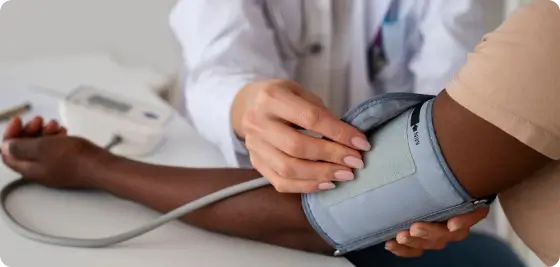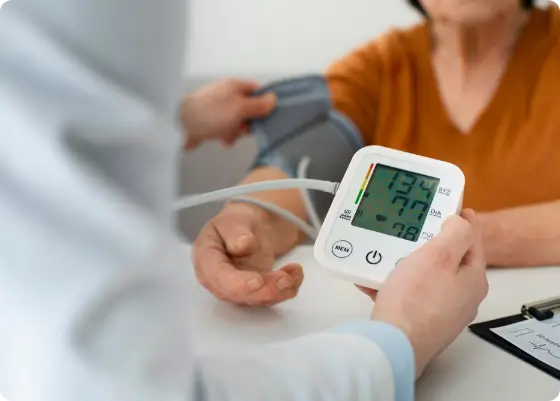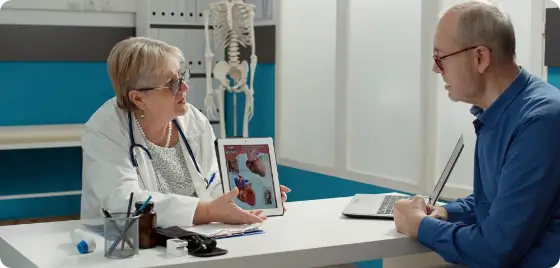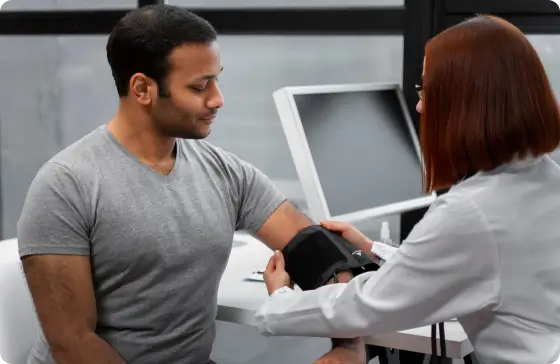What is a
blood pressure test?
A blood pressure test is a routine procedure to measure the force of the blood within the walls of your arteries as your heart pumps it around your body. This test is important in diagnosing high blood pressure (hypertension) and monitoring cardiovascular health.
Sometimes called a bp blood test, this screening is actually non-invasive and doesn’t require any blood draw. However, it can detect potential health problems before they become serious. Regular monitoring can help manage conditions such as high blood pressure, which is a major risk factor for heart disease and stroke.
These tests are simple, quick, non-invasive, and can be performed anywhere, including in a doctor’s office, hospital, or even at-home blood pressure monitor.
what does a blood
pressure test measure?
A blood pressure test measures:
High Blood
Pressure
The pressure in your arteries when your heart is beating (the highest number in a blood pressure reading). Blood pressure measurement helps to diagnose high blood pressure early so that it can be treated before it leads to serious complications.
Low Blood
Pressure
The lower blood pressure in your arteries when your heart comes to rest between beats (the bottom number on a blood pressure reading).
Additional Indicators of Heart Health
Provides insight into how well your heart and blood vessels are working.
Potential
Hypertension
Helps detect dangerous hypertension that leads to heart attacks and strokes.
Possible
Hypertension
Helps diagnose low blood pressure, which can cause unconsciousness and fainting.
Response to
Medication
Monitors effectiveness of antihypertensive medications.
Long-term
Changes
Monitors trends and changes in blood pressure to help manage chronic health conditions.
Who Is A Candidate For
Blood Pressure Screening?
Blood pressure screening is recommended for individuals of all ages as part of routine health care. However, certain groups are particularly encouraged to undergo regular screening:
- Adults over 40 have a risk of developing hypertension.
- Individuals with a family history of high blood pressure should be particularly cautious.
- Individuals with conditions like diabetes, kidney disease, or cardiovascular diseases increase the risk of hypertension.
- People with excess weight can increase blood pressure by putting additional strain on the heart and blood vessels.
- Individuals, who smoke and consume excessive alcohol can have a high blood pressure
- Blood pressure is routinely monitored during pregnancy to detect conditions such as preeclampsia, which can be dangerous for both the mother and baby.
how is a blood pressure
screening done?
A blood pressure test is a simple procedure that can be done in minutes. Here are step-by-step instructions on how it is done:
Preparation
The person should sit quietly for at least five minutes before the test. It is important to avoid caffeine, exercise, and smoking for at least 30 minutes before the test. The arms should be at the chest level, supported, and not tight clothing.
Cuff Placement
The healthcare provider wraps an inflatable cuff around the upper arm. The belt is then deflated, temporarily interrupting blood flow through the artery.


Measurement
The blood pressure cuff is slowly inflated while the health care provider listens with an audio device or monitors with a computer. The first place where sounds are heard indicates systolic pressure. The area where the pulse disappears marks the diastolic pressure. Sometimes take a manual blood pressure measurement using a stethoscope and a blood pressure cuff.
Recording
Systolic and diastolic pressures are recorded as two numbers, for example, 120/80 mmHg.
The process is quick and usually takes no more than a few minutes. A few iterations may be necessary to achieve accuracy, especially if the initial reading is higher or lower than expected.
understanding the results and
what happens next
- Your blood pressure reading consists of two numbers: systolic (when the heart beats) and diastolic (when the heart rests).
- Normal blood pressure readings are typically below 120/80 mmHg.
- Elevated readings (120-129/less than 80) or higher may indicate hypertension stages 1 or 2.
- A hypertensive crisis requires immediate medical attention.
- If your results indicate elevated or high blood pressure, our team will guide you through personalized consultation and support.
- We’ll work with you to manage your health effectively and address any concerns.
why choose cardiology care for blood pressure screening?
At Cardiology Care, we are committed to providing exceptional care and ensuring our patients achieve ideal cardiovascular health. Here are some reasons why you should choose Cardiology Care to measure blood pressure:
Expertise in Cardiovascular Health
Our team at Cardiology Care comprises experienced cardiologists. We bring years of expertise and knowledge to every blood pressure screening, ensuring accurate results and personalized care.
Modern Facilities
Our clinic is equipped with modern facilities and advanced technology to conduct comprehensive blood pressure screenings.


Compassionate Care
We understand that a cardiovascular health journey can be overwhelming, and we are here to help you every step of the way. Our compassionate team is dedicated to providing you with the care, guidance, and support you need to lead a healthy life.
Flexible Appointments
We make it easy to book your blood pressure appointment, prioritizing your health without adding any stress.
frequently asked questions
When to test blood pressure?
You should check your blood pressure regularly, especially if you have risk factors for high blood pressure, such as obesity or a family history of high blood pressure. Target at least once a year, or more often if advised by your healthcare provider for a specific health problem or condition. Periodic testing helps monitor your cardiovascular health and allows for early intervention if needed.
What to eat before a blood pressure test?
Before taking a blood pressure test, choose a snack or snack so it doesn’t affect your readings. Choose foods high in sodium and caffeine to prevent a temporary rise in blood pressure. Consider options such as fruits, vegetables, whole grains, or lean proteins for a more balanced approach.
How to breathe during a blood pressure measurement test?
Stay calm while checking your blood pressure. Breathe slowly and deeply to help your body relax. Inhale slowly through your nose, fill your lungs, and exhale slowly through your mouth. Avoid talking or excessive movement during the test to ensure accurate reading.
Is there a facility for blood pressure testing near me?
People in the Manhattan area searching for blood pressure test near me, bp check near me, or wondering where can i go to get my blood pressure checked can find top-quality blood pressure screenings and other cardiology services at Cardiology Care.





